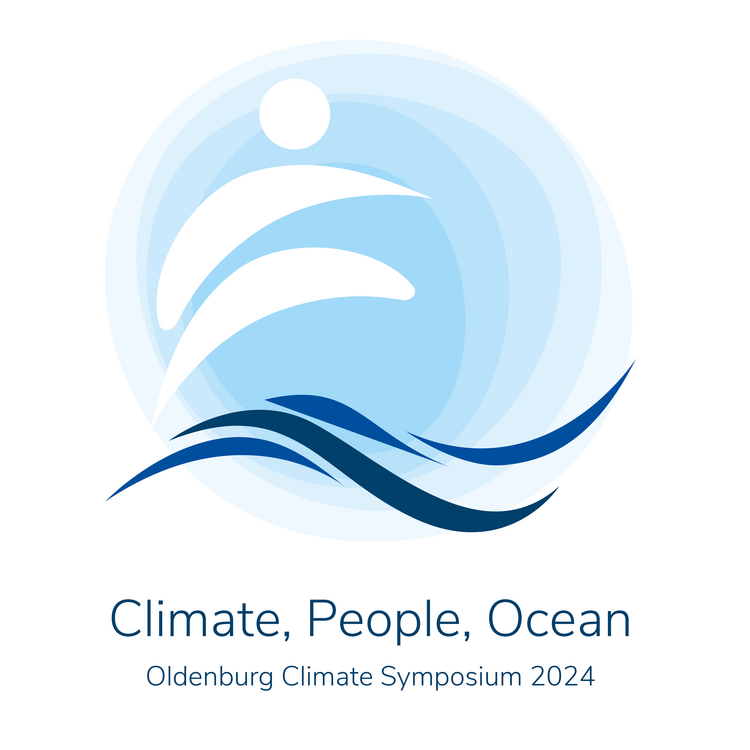Oldenburger Klimatage

Kontakt
Sophie Eggert
In Kooperation mit


Siehe auch
Oldenburger Klimatage 2024
10. + 11. September 2024: „Klima, Mensch und Meer”
Auch in ihrer zweiten Auflage halten die Oldenburger Klimatage ein breit gefächertes Programm für die Wissenschaft wie auch für interessierte Oldenburgerinnen und Oldenburger bereit. Unter dem Motto „Klima, Mensch und Meer“ liegt der Fokus in diesem Jahr auf den Ozeanen und ihrer Rolle für Gesellschaft und Klima in einer sich verändernden Welt.
Dialog und Diskussion über Disziplinen hinweg bilden den Kern der Klimatage und spiegeln sich auch im Vortragsprogramm: Die acht (englischen) Fachvorträge werden von international renommierten Wissenschaftlerinnen und Wissenschaftlern aus den Natur- und Sozialwissenschaften gehalten. Das Rahmenprogramm bilden Interaktionen an der Schnittstelle von Kunst und Wissenschaft sowie Workshops mit und für Nachwuchswissenschaftlerinnen und -wissenschaftler.
Zwei weitere Programmhöhepunkte richten sich insbesondere an die interessierte Oldenburger Öffentlichkeit.
- Am 10. September wird im cine k die Dokumentation „Expedition Arktis 2“ gezeigt. Zu Gast sind eine Wissenschaftlerin und ein Wissenschaftler, die an dieser Expedition teilgenommen haben und dem Publikum im Anschluss an die Vorführung Rede und Antwort stehen.
- Prof. Dr. Edenhofer ist Direktor des Potsdam Instituts für Klimafolgenforschung (PIK). In einem Abendvortrag am 11. September wird er aktuelle Einblicke in die Forschung an der Schnittstelle Klima und Ozean geben. Dieser Vortrag wird in deutscher Sprache gehalten.
Zur Registierung für das Vortragsprogramm gelangen Sie hier
Zum allgemeinen Programm gelangen Sie hier
Die Vortragenden
Session: Learning from the past

Wolfgang Kießling
FAU Erlangen-Nürnberg
Marine life’s responses to ancient hyperthermal events
Ancient changes in the biosphere, from organismic traits to wholesale ecosystem changes, can be aligned with climate forcing over the last 500 million years of Earth’s history. Ancient hyperthermal events, episodes of rapid global warming, were triggered by large-scale greenhouse gas release from volcanic volatiles and sediments. Then as now, these greenhouse gasses caused ocean acidification and deoxygenation interacting with warming seawater temperatures.
The responses of marine life to these ancient hyperthermals were similar to what we already observe under current climate change: Reduced productivity, reduction of body size, poleward range shifts, and collapse of tropical reef systems. In addition, the fossil record shows a plethora of climate-driven global extinctions and even mass extinctions with up to 85% loss or marine species.
It is especially the climate-driven extinctions, from which we can learn from the past to identify the consequences of worst-case climate-changes scenarios. Seeking commonalities among past climate-driven biodiversity crises, we can potentially identify vulnerable clades, traits and regions under future warming.

Bärbel Hönisch
Columbia Climate School
Reconstructions of Cenozoic atmospheric CO2 and ocean carbon cycle perturbations
Confident knowledge of past atmospheric CO2 levels is fundamental to our understanding of the drivers of past climate changes, evolutionary transitions and extinctions, and the sensitivity of our climate system to past, present and future carbon emissions. Over the past few years, a team of terrestrial and marine paleo-CO2 proxy experts has collaborated to compile published paleo-CO2 reconstructions and develop a dedicated database. Vetting and categorizing these data in the light of current proxy understanding has led to a much-refined Cenozoic CO2 record that covaries with independent climate estimates such as temperature, sea level and the evolution of C4 grasses. This refined CO2 record provides a reliable reference for climate scientists and modelers who aim to compare their data to or drive their models with paleo-CO2 information. However, significant data gaps remain to be filled and further proxy development and data intercomparison are essential to improve these reconstructions and establish a rigorous and reliable record of paleo-CO2. I will report on these efforts and provide some examples of marine carbonate chemistry perturbations across the Cenozoic.
Session: Move, adapt or ?

Iliana Baums
Helmholtz-Institut für Funktionelle Marine Biodiversität
How corals adapt to a changing climate
Corals build the three-dimensional structure of one of the most diverse ecosystems of the planet. Yet, their ecological role is threatened by climate change because small changes in ocean temperature cause coral holobiont dysbiosis. Warming ocean temperatures will exceed physiological limits of many coral populations within decades and their sessile nature means that adults are unable to move to escape the heat. Therefore, restoration interventions are required to ensure persistence of functional coral ecosystem. Despite sharp population declines, large standing genetic and phenotypic variation remains in even the most threatened reef builders. We know that standing genetic diversity fuels coral adaptation. Therefore, a prominent goal of coral conservation is to protect genetic diversity. It is nevertheless tempting to breed only those coral hosts (also called super corals) that are, for example, temperature stress resistant to hasten the process of adaptation. Selective breeding and conservation of standing genetic diversity are thus management strategies with conflicting goals. I will attempt to reconcile this conflict by discussing strategies to maximize the adaptation potential of reef building corals.

Malin Pinsky
Department of Ecology & Evolutionary Biology, University of California Santa Cruz
Marine species in hot water and on the move
Ocean life is on the front lines of climate change, with marine ectotherms living closer to their upper thermal limits and shifting their distributions faster than species on land. Marine communities are also rapidly turning over to new species compositions. I will discuss how large-scale observations are transforming our understanding of climate impacts on ocean life, some of the unique conservation challenges these dynamics create, and potential adaptation solutions.
Session: Climate Change and Coasts

Kerrylee Rogers
Universtiy of Wollongong
Rising tides, shifting shores and the resilience of coastal ecosystems to climate change
Sea-level rise will significantly alter coasts and associated ecosystems, such as mangroves and tidal marshes. Palaeoecological evidence and model projections suggest that inundation and erosion will increasingly dominate shoreline processes, impacting the extent and condition of coastal ecosystems. Observational data indicate that these ecosystems have some capacity to adapt to the changing conditions imposed by sea-level rise. Critical factors include sediment supply and vegetation productivity, which contribute to vertical growth of substrates. These processes underpin a positive relationship between inundation and vertical accretion that creates negative feedback under conditions of rising sea levels and contributes to coastal ecosystem and shoreline resilience.
Applying this feedback relationship, inundation and sedimentation are lowest at the landward margin of coastal ecosystems. Lateral expansion of inundation with sea-level rise is inevitable at the landward margin, only hindered by tidal obstructions from infrastructure, engineering structures (e.g., ditches, levees, and drains), and steep slopes that restrict tidal ingress and squeeze coastal ecosystems between land and sea. Conversely, at the seaward margin, where inundation frequency is higher, enhanced sedimentation aids vertical adjustment, while erosion may alter the lateral extent. Focusing on the dynamics of these margins, anticipated shoreline changes under varying conditions of sea-level rise and sedimentation can be classified.
Efforts to validate these predicted change classes using dense spatio-temporal data from the Landsat archive highlight the influence of sea-level rise and other climatic phenomena on coastal ecosystem condition and extent. Chenier and bars arising from storms and cyclones, and formation of beach ridges and spits associated with wave action modulate coastal ecosystem extent and condition. This may variably improve resilience to sea-level rise by providing a sediment subsidy or attenuate inundation; or reduce condition by causing erosion or impoundment of tidal waters. Climatic phenomena, such as ENSO, which affects temperature, precipitation, and tides, are implicated in widespread coastal ecosystem dieback. Concurrent drought conditions and extreme fire weather have caused unprecedented fire damage to coastal ecosystems and death of vegetation, raising concerns that compounding of climate change processes will restrict the negative feedback that underpins the resilience of coastal ecosystems. Monitoring coastal ecosystems using satellite technology can provide near real-time capability to identify declining conditions and could support early warning systems that guide actions to enhance resilience.

Andrea Bandelli
Woven Foundation for Creative Climate Communication
Turning the Tide: Leveraging Art and Emotion in Ocean and Climate Communication
We’re not only in a climate and biodiversity crisis, but also in a crisis of communication and imagination. Ocean science has provided us with clear evidence of the urgent threats facing our seas, but this knowledge alone fails to compel society to take the bold actions necessary to address the problem. As humans, our actions are driven not only by facts but especially by emotions—a challenging and uncomfortable subject for many to accept.
New insights from behavioral sciences, psychology, and cultural studies reveal that art and culture can craft narratives far more effective than simply presenting facts. However, this remains an uphill battle. Why should we be moved by these facts when our emotional engagement is what truly drives change?
Session: Global Ocean and Climate Change

Christopher J. Zappa
Lamont-Doherty Earth Observatory of Columbia University
Ikaaġvik Sikukun: Bridging the Scientific and Indigenous Communities to Study Sea Ice Change in Arctic Alaska
Taking its name from the Iñupiaq phrase for “ice bridges,” the Ikaaġvik Sikukun project has successfully built bridges between a diverse team of scientists and Indigenous Knowledge-holders to study the changing sea-ice environment of Kotzebue Sound, Alaska. We have broken new ground by co-producing our hypotheses in partnership with an Indigenous Elder advisory council to develop research questions that cut across disciplinary boundaries and address the needs of both the local Qikiqtaġruŋmiut people and scientific community. To share our story broadly and in a way that respects the oral traditions of Indigenous Knowledge, our team also includes an ethnographic filmmaker who has been documenting each step of our unique research journey. For nearly a decade, with continued guidance from our advisory council, we have designed and carried out a research plan to observe the sea ice and marine mammals in Kotzebue Sound and how these come together as habitat and hunting grounds. Using satellite data, unoccupied aerial systems (UAS), oceanographic moorings and on-ice measurements to address our research questions, we have witnessed two exceptional years (2018 and 2019) with unprecedentedly low sea ice extent and the earliest start of ugruk (bearded seal; Erignathus barbatus) hunting in recent memory – contributing to a broader trend towards shorter spring hunting seasons, which have been recorded in Kotzebue since 2003. We also observed the thinnest landfast ice likely in over 70 years, a strong vertical ocean heat flux into the ice that impacted the thickness of this ice growth, and the widespread flooding of the landfast ice, possibly caused by relatively high snowfall on top of thin ice, as well as the breakup, detachment and fragmentation of large sections of landfast ice recently occupied by natchiq (ringed seal; Phoca hispida) pups, adults, and their lairs. Having integrated Indigenous Knowledge throughout our approach, we are now in a unique position to turn these interrelated observations into answers to our research questions. Here, we describe an overview of what, to the best of our knowledge, is a precedent-setting approach to co-creating research questions and hypotheses that integrate indigenous knowledge and interdisciplinary scientific methods, focused specifically on the implications of changing ice conditions on marine ecosystems and Indigenous ways of life.

Annette Breckwoldt
Leibniz-Zentrum für Marine Tropenforschung
Connecting local island lives to global ocean data
As an interdisciplinary scientist with a marine biology starting block, my works aims at revealing human-ocean interactions, involving a participatory, inter- and transdisciplinary integration of academic and ecosystem user knowledge on coastal marine resources and their various contextual functions and values. The projects SOCPacific and SOCPacific2R will be briefly introduced, i.e. how they have developed from longstanding trusted collaborations aiming to understand the everyday lives and challenges of diverse stakeholders in coastal and especially small island environments in the South Pacific, incl. how people perceive, manage, exploit, and protect these. Envisioning a comprehensive analysis of fisheries management, marine governance, and the socio-cultural dynamics surrounding fishing practices and reef passages in Fiji, New Caledonia, and Vanuatu, these projects also contribute to connect local island lives to global ocean data and climate change discourses by supporting the integration of the lived experiences of island communities into global discussions on ocean health and climate change. Bringing these geographical yet not contextual extremes together, the previous speaker, Prof. Dr, Christopher Zappa, and I will jointly strive to connect some thematic and methodological dots and challenges on how to generate, analyse and integrate ‘ocean data’ in equitable, impactful and meaningful ways.
Die Veranstaltung wird weder aufgenommen noch als Hybridveranstaltung angeboten.
Die Anmeldung ist kostenlos.
Das Oldenburger Klimasymposium findet alle zwei Jahre statt und steht jedes Jahr unter einem anderen "Klima, Mensch, X". Im Jahr 2024 ist das "X" das Meer.


